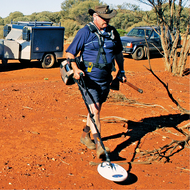The department urges all prospectors to carry a Personal Locator Beacon, a GPS and telecommunication device
| Date: | Friday, 24 May 2019 |
|---|
A number of fatalities and incidents over recent years is a dramatic reminder of the need to put safety first when prospecting in Western Australia’s harsh outback.
That’s the message from the Department of Mines, Industry Regulation and Safety (DMIRS) as it reminds outback travellers of its Seven Golden Rules for Prospecting.
DMIRS Resources Tenure Executive Director Rick Rogerson urges prospectors visiting remote areas to always carry a Personal Locator Beacon (PLB), a GPS (Global Positioning System instrument) and telecommunication equipment.
“Prospecting is a popular and adventurous activity, but these regional and remote areas can also be brutal environments,” Mr Rogerson said
“GPS and PLBs are crucial to prospector safety; they're affordable, cheaper than a mobile phone and may save your life.
“While most people carry a mobile phone, it should not be your primary communication safety device while visiting regional and remote areas.”
GPS and PLB devices, which are available from most camping stores, are considered by search and rescue organisations to be ideal for use in remote areas as they do not rely on telecommunication networks for a signal.
Mr Rogerson said prospecting is becoming increasingly popular and that a lot of inexperienced prospectors would be going bush for the first time and exposing themselves to the dangers.
“It’s important to remember there have been prospector fatalities and a number of close calls over the past few years,” Mr Rogerson said.
“We need to remind first-timers and inexperienced prospectors of the risks they face and that they need to take responsibility for their own safety.
“Trying to find missing prospectors is not only stressful for the family and friends of those lost, but also stretches precious police and emergency resources.”
Searches for missing prospectors average 11.3 hours but many last one or two days, while aircraft searches cost up to $5000 per hour
In early 2018 a novice prospector’s body was found 2.5 kilometres from his campsite, while in 2012 a father-of-two is thought to have died after a 15-day search failed to locate him.
The Coroner’s Court was told that of the nine prospectors who had been reported missing in 2012, only one had been carrying a PLB.
DMIRS expects the 2019 prospecting season to be busier than ever with the department issuing more than 1480 Miner’s Rights since the beginning of the year.
The Seven Golden Rules for Prospecting campaign will target tourist bureaus, libraries, caravan parks and DMIRS offices with posters, brochures and booklets.
For more information about prospecting, visit your nearest Mining Registrar's office to obtain a copy of Prospecting in WA or download it from www.dmp.wa.gov.au/prospectingwa
The Seven Golden Rules
1. Put safety first
- Make sure you have enough water, fuel, maps and first aid supplies
- Give serious consideration to taking some form of telecommunications and a global positioning system to fix locations, and a Personal Location Beacon (PLB) - it may turn out to be your most important safety device.
2. Obtain a Miner's Right permit
when prospecting on vacant Crown land ($25 from any Mining Registrar's office).
3. Obtain a 40E permit
when prospecting within an exploration tenement (if you do not have written permission from the tenement holder).
4. Get written permission
from the tenement holder when prospecting on:
- a mining lease
- an exploration licence (if you do not have a 40E permit)
- a prospecting licence
5. Comply with all legal requirements
when prospecting on a pastoral lease, this includes gaining permission from the pastoralist for access to certain areas.
6. Show respect when on Crown land
because it is used or set aside for many purposes, including:
- pastoral and grazing activities
- parks and forests
- the use and benefit of Aboriginal people
- mining activities
7. Fill any holes
that you dug and repair ground that has been disturbed.

